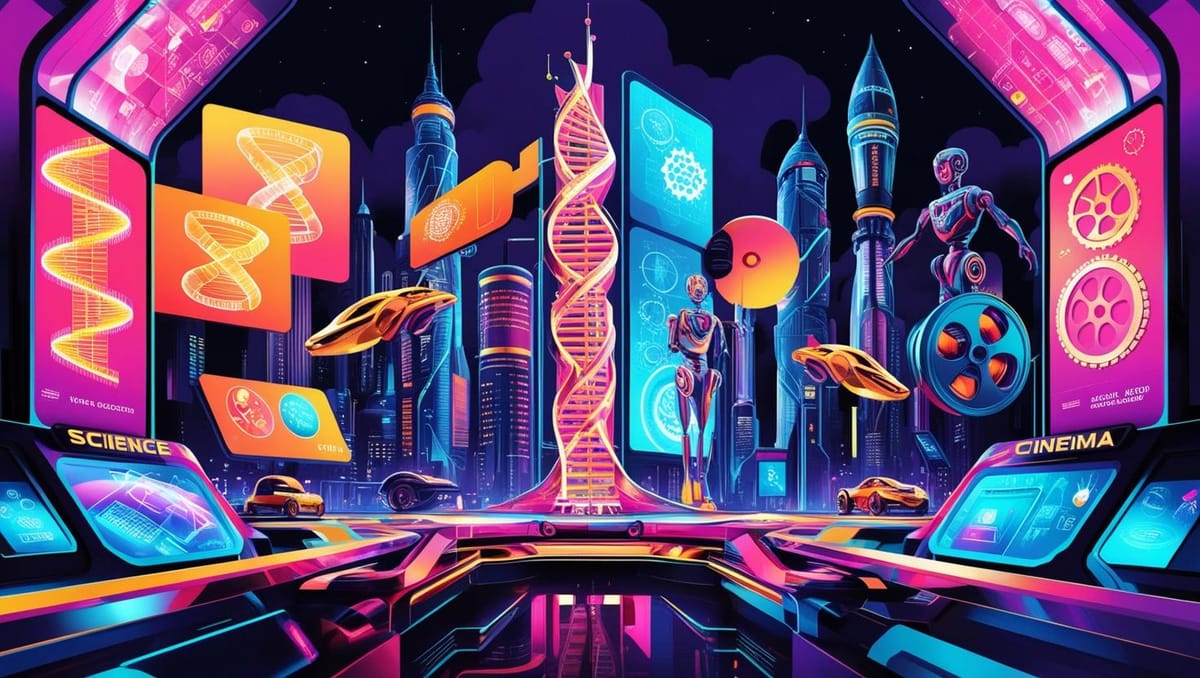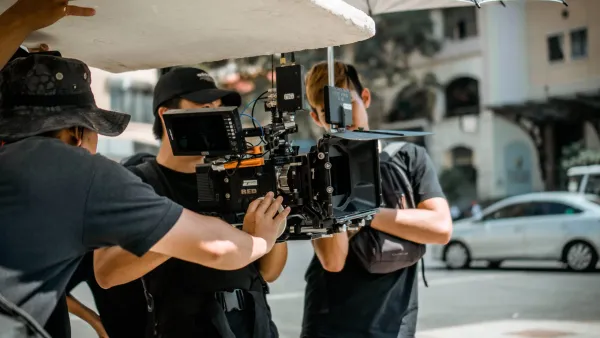Science, Technology and Cinema: Three Powers Shaping the Future

Science fiction is one of the most creative and inspiring genres of cinema. The technological potential of science fiction films focuses on exploring humanity's possibilities and future. This genre is not only active but also draws attention with deep content and suggestions for humanity's development.
Technology, science, and cinema represent three great powers, each having revolutionized, Industrial Revolution, its own field, and profoundly influenced human history.
The relationship between cinema, science, and technology becomes more intertwined and deepens each day. While films explore the boundaries of global developments and technological advances, real-world developments inspire cinema. As each development is tested in the film industry, the perception of virtual reality in films has reached incredible dimensions.
Another aspect is cinema's effect on directing developments in science and technology. Films created with imagination occasionally push the boundaries of this imagination. Therefore, various studies are being conducted to create the desired effect. It's similar to the technological development shower we experienced during the Industrial Revolution. The more intensive the work on a subject, the more technology is created to meet the needs in that area. Science and technology sometimes have pioneering effects and sometimes facilitating effects.
The Evolution of Science Fiction Cinema
Science fiction is one of the oldest and most popular genres in cinema. Initially used to imagine the distant future and space travel, science fiction began to present deeper narratives based on technology. "A Trip to the Moon," the first science fiction film made in 1902, must have attracted considerable interest when it was shown. We can say it's the most popular of hundreds of fantasy films shot by Méliès. Masterpieces like "2001: A Space Odyssey" (1968) presented a vision shaped by guides and foundations.
Today, parallel to its technological evolution, it continues to address topics such as artificial intelligence, biotechnology, and virtual reality. This genre of cinema helps us understand and follow scientific knowledge and shape our future thoughts. Moreover, it takes us on a journey through a world we might never be in and includes us in that world.
In the world of cinema, productions have undergone a tremendous transformation. At the beginning of the 20th century, the film industry was limited to only mechanical camera systems and analog film technologies. However, with the digital revolution, cinema's production examples, mold formats, and viewer experience completely changed. Advanced technologies have definitely directed cinema.
The Rise of Digital Camera Technology
Analog film was the first product of the cinema world, even its cornerstone. However, the introduction of digital cameras led to a revolution in cinema. The fact that digital cameras became cheaper and could shoot at higher resolutions in the late 1990s allowed filmmakers to have greater creative freedom.
Digital film technologies not only increased image resolution but also caused the evolution of narrative techniques in cinema. For example, the digital effects and virtual environments used in Peter Jackson's "The Lord of the Rings" series pushed the boundaries of the film industry. Digital technologies have made filmmaking easier and have received great interest. It has now settled into our lives to the extent that it cannot leave and in a way that we cannot return to the old ways.
Artificial Intelligence and Cinema: The Narrative of Advanced Technology
Artificial intelligence has begun to play a major role not only in the scientific world but also in cinema in recent years. Films question whether artificial intelligence will replace humans, what kind of dangers it might pose for humanity, or how it can be a helper. Produced films, especially short films, address how artificial intelligence is perceived socially while also dealing with the ethical dimensions of these technologies. Cinema manages the potential of artificial intelligence while also helping to emerge and carry new problems brought by these technologies.
Modern science fiction productions offer different perspectives on how artificial intelligence is integrated into people's lives. While films show the potential benefits and dangers of artificial intelligence, the ethical aspect of this technology and the following innovations are also on the agenda.
Virtual Reality: Removing Boundaries Between Cinema and Viewer
Virtual reality (VR) and augmented reality (AR) have a huge innovation potential in the cinema world. "The Matrix" (1999) was the largest application area of VR technology in cinema and created a major intellectual transformation. This film examined how people living in a virtual world questioned their reality and its meanings, and it received great interest.
Virtual reality and holograms will not only allow the viewer to see on the screen but also enable them to explore a world they enter. In the future, theaters in cinema might offer a completely virtual film-watching experience. Distribution with VR glasses and augmented reality devices might even allow interaction with characters in a film.
Virtual reality (VR) technology offers the potential to create a more harmonious experience with the audience in cinema. In the cinema world, using this technology provides an experience that is one step closer to application. Films now begin to appeal not only to our eyes but also to our voices. VR headsets and 360-degree videos have added a new dimension to cinema. Thanks to this technology, we can virtually enter a film and navigate the world experienced by the characters. This is an incredible experience. It's a development that even changes and interrupts our perception of reality.
Biotechnology and Genetics: The Future of Cinema
Biotechnology, especially topics like genetic engineering and CRISPR, has been the theme of many science fiction films in recent years. As genetic engineering offers the possibility to change human genetic modification, cinema has begun to address this issue directly. Films examine the existence of genetic modifications on humans, ethical issues, and possible dangers. They draw our attention to the potential risks of biotechnology and ask us to find solutions.
3D and IMAX Cinema
Another major innovation in the cinema world is the development of 3D technology. 3D films have increased interest in cinema by offering a deeper experience to projects. For example, James Cameron's "Avatar" in 2009 reached the peak of 3D technology and played an important role. This film reshaped the 3D experience of cinema not only as an entertainment tool but also as a visual art formula.
Similarly, IMAX cinema is another important technology that transforms the film-watching experience. The giant screens and advanced sound systems offered by IMAX convince us that cinema truly has magic by giving cinema viewers the feeling of getting lost in films.
Brain-Computer Interfaces
With the development of brain-computer software, the cinema experience can be taken to an extraordinary dimension. In this new era where we can directly participate in the film experience with our brain, we can directly take part in the film instead of visual and auditory stimuli. What an interesting experience, right?
Visual Effects of Technological Developments in Cinema
Science fiction films are often based on scientific theories and, along with this, often produce fantasies by departing from reality. While occasionally bringing real astrophysics theories or other scientific theories to cinema, it handles concepts like time travel and dark details in films quite complexly. Care should be taken for formal accuracy in such films.
Similarly, the film "Decommissioned" also established a very solid foundation with real scientific data while telling the story of an astronaut who continues to survive inside a spacecraft.
Finally, technology has somehow changed the visual aspect of cinema as well. Thanks to digital cinema, visual effects, and CGI (computer-generated imaging), a scene can now be created within the limits of imagination. Films triggered a revolutionary change in cinema that demonstrates the power of these technologies. The effect of visual change and technology on cinema has led to unprecedented interest in products.
The future of innovations born from the combination of technology, science, and cinema is quite exciting. Areas such as developing artificial intelligence, robotic technologies, virtual reality, and biotechnology are bringing us experiences in the cinema world that were previously unimaginable.
In the future of cinema, it seems that traditional viewing experiences will change to become more interactive and immersive. We might see the beginning of an era in cinema theaters where one can interact with films and even change the course of the film. AI-supported scenarios can offer unprecedented flexibility in cinema. All of these are already creating excitement.
Technology, science, and cinema have each created great revolutions in their own fields, and cinema inspires by bringing these fields together. As cinema continues to evolve as a continuation of technology and science, these evolutions will have significant effects both at societal and individual levels. Technological innovations will not only make the experience more visual and entertaining but will also bring about great changes for humanity. Ethical issues will emerge, and suggestions will also emerge.
The interaction between this trio will continue more deeply in the future, and new opportunities arising from the combination of cinema, science, and technology will nourish human imagination. These dynamic forces shaping the future will use cinema not only as an entertainment tool but also as a way to explore humanity's vision, dreams, and fears.
A Few Short Film Recommendations in Science Fiction Genre (All are available on the Cineshort App)
The first short film I would recommend is Decommissioned, which I mentioned above, an interesting thriller-science fiction film. Our hero is an astronaut serving inside a spacecraft. He is conducting research, but suddenly encounters something unexpected. They encounter a spacecraft they knew from years ago, now decommissioned. But now, this innocent spacecraft they called a "satellite-suit" has transformed into something unknown and frightening. The astronaut cannot explain the situation to the center, and events evolve in a completely different direction. It's a good film for science fiction lovers.
Another short film I would recommend is Rise, a wonderful science fiction film. Our hero is a robot that has achieved consciousness. They engage in a war with the human race. The conversation with the colonel who captured the robot is actually a confrontation. I think technological devices and studies on artificial intelligence are very important. We certainly might need developments that will make our lives easier, take us to a higher level, and ensure social peace. But I have concerns as well. One is the accuracy and morality of what we are trying to teach artificial intelligence, which actually coincides with the subject of the film. What will determine these? Another issue is whether destroying a robot will be considered murder if consciousness occurs? Or will the robot be included in the punishment system? What I mean is; technological developments happen faster than we think, but are we, as humans, ready for this with our entire system, structure, practices, and level of moral development? I have reservations about this, to be honest. Returning to the film, I definitely recommend it.
Another short film, Birthday of the Camera Phone, is a very interesting documentary you will watch. The connection between the birth of the phone camera and the birth of a baby is very well established. I should also mention that these kinds of inventions are mostly made by people who are roughly called "broken-headed" in society, who don't quite conform to social norms. I definitely liked it very much. It captivates you with its story. The birth of a baby and the birth of a technological product are very nicely blended and presented with a good analogy. I definitely recommend it.
Another beautiful short film that deals with the problem created by technological developments, 10K, is a quite impressive thriller drama. Our hero is a social media content creator, an influencer, which is the most popular job of the new era. It's impossible to do this job without reaching a certain number of followers. And what will enable him to reach the targeted number is interesting content. But what happens if someone sets their sights on your place when you reach that follower count? The answer is in our film. An unavoidable reality is social media, and we now value our existence on social media more than our existence in real life. Relationships there seem to have replaced relationships in real life and shape our lives. Now it seems like just a matter of time for an ordinary person to become famous, and a huge economy revolves around this. With everything we share, we are actually content creators, and we all care about how many likes we get. But should this be in a way that darkens our lives and someone else's life, is there a limit to this? Both real-life and virtual medium communications are different types. Whichever we choose and for whatever purpose we make this communication, let's not forget that we are human, that we carry human values, and that we are addressing humans. Returning to the film, I definitely recommend watching it.
Emotional Intelligence is a very enjoyable film to watch in the science fiction-animation style that makes one think. Our heroes are two technological products equipped with emotional intelligence. Being equipped with emotional intelligence will also create big differences in behavior and decisions. Frankly, the film reminded me of metaverse, the new socialization area of recent times. Can we fit everything into a computer hardware, what about our emotions and need for face-to-face interaction, is endless happiness possible, how will we understand and be happy in a world where unhappiness doesn't exist? Such questions have not yet found their answers. I definitely recommend watching this quite impressive film.
New technological developments are included in our lives every day, and these developments now also affect our behavior. A very good example of this is Social Mediation, a good action film. Our heroes are a very popular couple on social media and have many shares. These shares ultimately mean money, and what will happen to these shares in case of a breakup? The answer to this question is in the film. Today, the place of socialization is mostly through the virtual world, and this interaction craze drags us along. We are now especially faced with a phenomenon called "duck syndrome." People who appear happy and satisfied with everything in this world, on the other hand, serve feelings of admiration, inadequacy, and unhappiness to their followers. It's a very good film, I definitely recommend it.
Vortex is a great thriller film. It very nicely portrays the modern human who has become a slave to the virtual realm and the virtual obligations of that new medium. Our social media shares have now become indispensable parts of our lives. But these shares also bring along feelings of inadequacy. The troubles of daily life, relationship problems, failures are not reflected in social media shares, and this leads to deceiving ourselves and our surroundings. The subject is very well handled, a good film.
Alone is a wonderful animation full of meaning. Our hero is an individual stranded alone on an island. To relieve his boredom, he jumps onto a platform he sees and sets out into the vast sea. But like everything, this also has an end. Unfortunately, we are very alone in crowds today. To escape this loneliness, we can find no other way out than to take refuge in the virtual world that disconnects us from the reality of the real world. Alone has quite impressive imagery. We want to live in crowds, to socialize, which is a need, and we also want to go to that desolate island inside us. Our technological devices sometimes become that "desolate island." This makes us feel like we're in a crowd, but in reality, it doesn't take us beyond just a phone and individual reality. These time periods are breathing breaks while dealing with people, our jobs, and other problems. Thanks to the internet, every place in the world we want to see is at our fingertips. You're free to go anywhere, provided you return I definitely recommend the film to everyone. Be sure to watch it.
Conclusion
The interaction between science, technology, and cinema creates not only an entertaining show but also a platform where social, ethical, and popularity announcements are made. Films not only imagine the future but also address today's technological and scientific developments. In the future, with the combination of these three powers, more advanced and interactive experiences await us in cinema. This magical world and technological developments are quite exciting, and they should still be in our lives with their life-facilitating and entertaining functions. Losing our humanity and those beautiful virtues belonging to humans is my biggest concern in this regard. Stay with science, technology, and, most importantly, short films.

